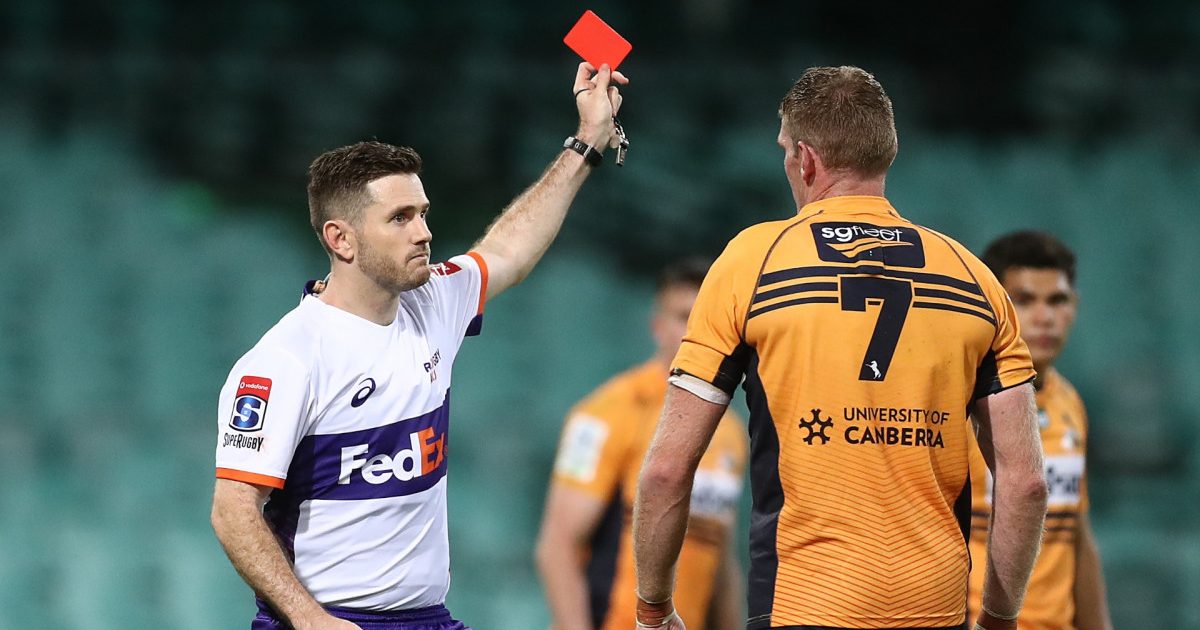Where 'conundrum' 20-minute red card stands now with World Rugby

Joe Schmidt is hoping the 20-minute red card law trial will be picked up by one of the main northern hemisphere tournaments ahead of the new season in Europe to help broaden the World Rugby research into whether this controversial tweak is worth permanently bringing into the sport. The former Ireland coach is now based back in New Zealand working as the World Rugby director of rugby and high performance and the introduction of the 20-minute red card, whereby the team that loses a player can being on a replacement 20 minutes later, has been one of the more divisive law trials in recent years.
The big club tournaments in the southern hemisphere – Super Rugby AU, Super Rugby Aotearoa and Super Rugby Trans-Tasman – have all utilised their 20-minute red card trial while it was also used in the gimmicky Rainbow Cup, the one-off European tournament that was supposed to see the four big South African franchises take on the PRO14 teams but instead the cross-hemisphere action was limited to a final in Italy between Benetton and the Bulls.
With rugby searching for a happy medium of appropriate sanctioning and not completely ruining a match itself, even All Blacks boss Ian Foster is on the record as being a fan of the 20-minute red card. However, the trial wasn’t put forward for global use from August 1 unlike some other tweaks such as the 50:22 kick and the goal-line drop out.
Inconsistencies in sanctioning continue to be a frustration across the game: look at how Faf de Klerk was yellow-carded against the Lions in midweek by a South African referee for a shoulder to the head contact that Warren Gatland believed would have been a red card in the UK and Ireland.
Reflecting on the 20-minute red card situation and where it currently sits with World Rugby, Schmidt told RugbyPass: “I see the positives in it and the negatives. We want to make sure that sanctions are severe. We want to make sure that players, if you are going to modify behaviour, then if there is a severe consequence the player is going to look to modify that behaviour as quickly as they possibly can.
"I can't understand the comments were that there was no contact with the head"
– Gatland turns up the heat ahead of planned Friday meeting with the Lions tour referees#LionsRugby #CastleLionsSeries #LionsSA2021https://t.co/QlK148jk7L
— RugbyPass (@RugbyPass) July 15, 2021
“Some of the incidents are a bit of mistiming and it’s a genuine rugby incident, then sometimes it is pretty tough on a player and whether or not they get a 20-minute red card or the red card is for the entire match that individual player still has to attend a judiciary, they still start at the mid-range point of six weeks punishment in terms of suspension, so they still get punished the same way even though their teammates will get punished for the entire game.
“That is part of the conundrum and there are a number of closed 20-minute red card trials that have taken place and what we are trying to do is just collate the information on those, we will put that feedback together and that will help guide as to whether or not it is something we should consider. That guidance comes from players, coaches and referees that feed that information into us as well as the numbers we get.
“At the moment there are still a number of closed trials happening with the 20-minute red card so as long as those closed trials continue and if they broaden and it’s picked up by one of the big competitions in the northern hemisphere, then that might give us more data than we have and find out whether it works in the game or whether we have to stay as severe as we can be with the punishment for the entire team rather than just really targeting the player who has obviously created the foul play situation.”
Schmidt also felt that the desire of World Rugby to quicken up the game at the breakdown won’t lead to more tackles happening in a game. Ruck speeds have reputedly on average come down by a second this year but this increase in the ball getting played hasn’t equated to defences needing to put in more tackles to shut down the attack.
“We haven’t seen any increase. While we have had an increase in ruck speed we haven’t seen any increase in the tackle numbers, so those two things aren’t correlating for us at the present time because what tends to happen is if the ruck speed is very quick the defence is still on their heels, they have less chance to get off the line and really dominate the tackle.
“Once you don’t get the advantage line or your ruck speed is slow then the next tackle is easy to make because they have all the time and space they can take away from you whereas when the ball comes quickly you have more time to make more passes. It’s a double spin-off in that you can actually keep the ball out of contact for longer when the ruck speed is quicker.
“That would be just purely as a coach, the ruck speed would be something that would make sense to me and again the numbers that we are seeing that would be the correlation, that quicker ruck speed is not going to cause more tackles.”
"It’s not about being painted as the bad guys"
– How World Rugby are looking to change https://t.co/SPP383l8dZ
— RugbyPass (@RugbyPass) July 14, 2021












































































